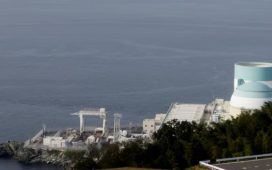Russia’s invasion of Ukraine, North Korea’s growing missile prowess and rising tensions around Taiwan – including Chinese military exercises that involved throwing missiles into waters near Japan – have all contributed to its concerns. Last year Kishida became the first Japanese prime minister to attend a Nato summit.
In managing relations with China, it is absolutely necessary for Japan, the US and Europe to work together as one
On each stop of his five-country tour, Kishida explained Japan’s defence expansion and regional security worries. It culminated with a joint US-Japan statement that blamed China and North Korea for making it necessary to ramp up the nation’s military capability.
“In managing relations with China, it is absolutely necessary for Japan, the US and Europe to work together as one,” Kishida said in a speech at the Johns Hopkins University School of Advanced International Studies in Washington on Friday.
Eagerness to get involved with a wider range of partners manifested itself in last year’s decision to work on a next-generation fighter jet with the UK and Italy, rather than with the US. Japan is set to negotiate an information-security agreement with Canada as part of a joint action plan sealed last year, which includes joint military exercises and defence exchanges.
Japan’s new-found openness to such ideas has met with particular enthusiasm from London. “Japan is our closest security partner in Asia and the UK is Japan’s closest security partner in Europe”, Sunak said in an op-ed published in Nikkei Asia. “Between us is an unbreakable bond that reaches halfway around the world”.
Closer to home, talks are also under way with the Philippines on deepening defence ties.
None of this obliges any of Japan’s partners to come to its aid in the event of a conflict over Taiwan, or the East China Sea islands disputed between Tokyo and Beijing, known as Diaoyu Islands in Japanese and Diaoyu in Chinese. Unlike the US, other G-7 partners have made no treaty pledges to help defend Japan.
“In the event of a contingency around Taiwan or the Diaoyu Islands, I don’t think they are expecting the UK or France to come to the Indo-Pacific,” said Kyoko Hatakeyama, a professor of international studies at the University of Niigata Prefecture. Still, she added, the effect Japan is seeking is deterrence.
Japan’s strategy with G-7 members appears to be following its engagement with Australia. Ties with Canberra progressed to a defence agreement last year in which the two countries pledge to increase interoperability between their forces.
Pressure from the US could prompt Australia and other countries to offer some degree of assistance in the event of a Taiwan contingency, said Graham from IISS. But he warned that Japan’s dubbing of Australia a “quasi ally” might be misleading.
“The whole point about alliances is that they are definitive”, he said. “It’s a black and white commitment – we will be there for you. I don’t think the Australians are going to offer that”.
Japan’s outreach to partners like Australia and the UK also serves as insurance in case US power in the Asia-Pacific begins to fade, according to Amy King, associate professor at the Australian National University’s Strategic & Defence Studies Centre.
Until recently, the US has been by far the largest military presence in Asia, providing protection for its allies including Japan. However, concerns over the rise of “America First” rhetoric among US conservatives has led Tokyo to hedge its bets in the event of a US departure.
“It’s Japan diversifying the partners with whom it acts”, King said. “It doesn’t want to put all its eggs in the US basket any longer”.















